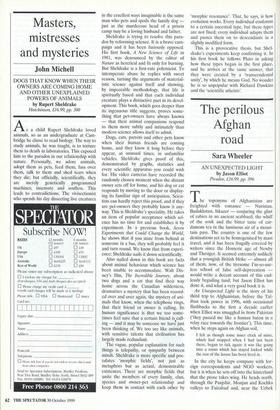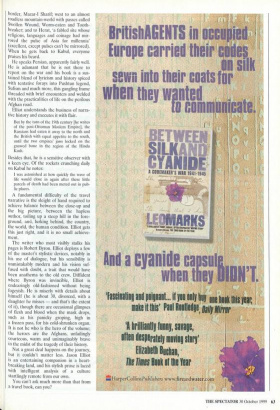The perilous Afghan road
Sara Wheeler
AN UNEXPECItD LIGHT by Jason Elliot Picador, £16.99, pp. 396
The toponyms of Afghanistan are freighted with romance — Nuristan, Badakhstan, Iskazer — conjuring the glint of rubies in an ancient scabbard, the whiff of the souk and the bitter taste of car- damom tea in the luminous air of a moun- tain pass. The country is one of the few destinations yet to be homogenised by mass travel, and it has been frugally covered by writers since the Homeric age of Newby and Thesiger. It seemed extremely unlikely that a youngish British bloke — almost all of them, now, of the tiresome I'm-so-use- less school of false self-deprecation would write a decent account of this end- lessly beguiling land; but Jason Elliot has done it, and what a very good book it is.
An Unexpected Light is the story of his third trip to Afghanistan, before the Tal- iban took power in 1996, with occasional flashbacks to the first a decade earlier when Elliot was smuggled in from Pakistan ('they passed me like a human baton in a relay race towards the frontier'). This time, when he steps again on Afghan soil,
I felt as though some inner clock of mine, which had stopped when I had last been there, began to tick again: it was like going into a room which has stayed locked while the rest of the house has been lived in.
In the city he keeps company with for- eign correspondents and NGO workers, but it is when he sets off into the hinterland that the prose takes wing. He heads north, through the Panjshir, Monjan and Kochka valleys to Faizabad and, near the Uzbek
border, Mazar-I Sharif; west to an almost roadless mountain-world with passes called Swollen Wound, Worm-eaten and Tooth- breaker; and to Herat, 'a fabled site whose religions, languages and coinage had mir- rored the pulse of Asia for millennia' (excellent, except pulses can't be mirrored). When he gets back to Kabul, everyone praises his beard.
He speaks Persian, apparently fairly well. He is adamant that he is not there to report on the war and his book is a sus- tained blend of lyricism and history spiced with tentative forays into Pushtun legend, Sufism and much more, this gangling frame threaded with brief encounters and welded with the practicalities of life on the perilous Afghan road.
Elliot understands the business of narra- tive history and executes it with flair.
But by the turn of the 19th century [he writes of the post-Ottoman Moslem Empire], the Russians had eaten it away to the north and the British with equal appetite to the south, until the two empires' jaws locked on the gnawed bone in the region of the Hindu Kush.
Besides that, he is a sensitive observer with a keen eye. Of the rockets crunching daily on Kabul he notes:
I was astonished at how quickly the wave of life would close in again after these little parcels of death had been meted out in pub- lic places.
A fundamental difficulty of the travel narrative is the sleight of hand required to achieve balance between the close-up and the big picture, between the hapless author, toiling up a steep hill in the fore- ground, and, lurking behind, the country, the world, the human condition. Elliot gets this just right, and it is no small achieve- ment.
The writer who most visibly stalks his pages is Robert Byron. Elliot deploys a few of the master's stylistic devices, notably in his use of dialogue, but his sensibility is unmistakably modern and his vision suf- fused with doubt, a trait that would have been anathema to the old crew. Diffident where Byron was invincible, Elliot is endearingly old-fashioned without being fogeyish. He is miserly with details about himself (he is about 30, divorced, with a daughter he misses — and that's the extent of it), though there are occasional glimpses of flesh and blood when the mask drops, such as his panicky groping, high in a frozen pass, for his cold-shrunken organ. It is not he who is the hero of the volume; the heroes are the Afghans, unfailingly courteous, warm and unimaginably brave in the midst of the tragedy of their history.
Not a great deal happens on the journey. but it couldn't matter less. Jason Elliot is an entertaining companion in a heart- breaking land, and his stylish prose is laced with intelligent analysis of a culture startlingly remote from our own.
You can't ask much more than that from a travel book, can you?



























































































 Previous page
Previous page